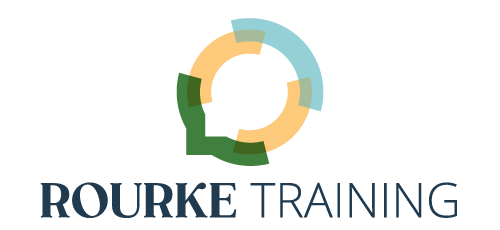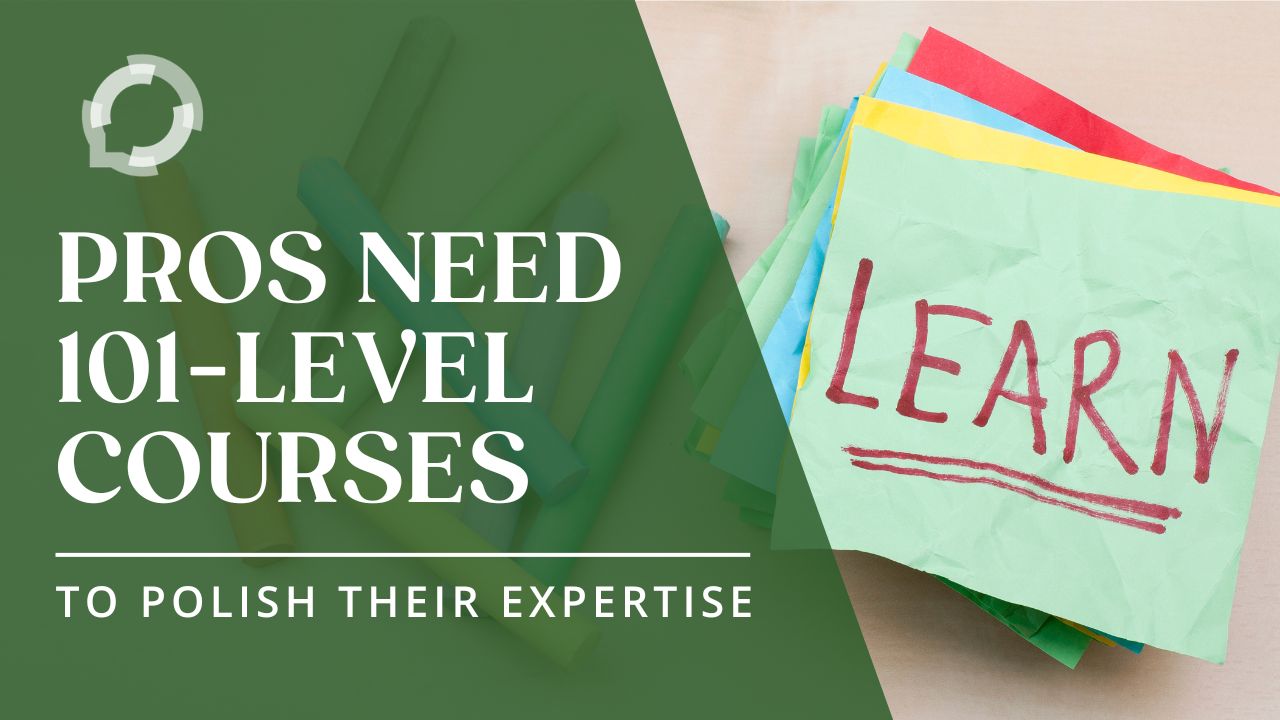January, the season for resolutions and renewed good habits. So much good intent and initial momentum. All too often, so little execution and staying power.
Pros know that ongoing mastery is essential throughout their career. Few can get by with a “one and done” or a “fake it til you make it” approach to new material or teaching methods. Sustained engagement with the field broadens and deepens knowledge because it builds layers that support each other.
If you’re a Subject Matter Expert (SME), you probably have plans to extend your knowledge in your area/s of focus this year. Maybe you’re attending an advanced seminar or you’re on the schedule to work one-on-one with the premier coach in your discipline. A new certification might represent your investment for the full year. Those kinds of activities are a key part of developing your skills so you can stay in top professional form.
But pros also consider the value of starting over, of NOT delving deeper into their field but instead exploring the space where new learners dip their toes in.
I’ve talked about the role of scaffolding in instructional design. When your audience begins at the beginning and has strong structural support, they learn more effectively.
As it turns out, this is as true for pros as it is for new folks. If you really want to develop your expertise as an SME, go back to basics. Know what your attendees are experiencing. Take some intro-level courses with other experts. Read the For Dummies book on your area of focus. Have a trusted friend take your course; observe how they respond to your material and ask for feedback. The more you can do to put yourself in the mindset of someone new to learning about your area of expertise, the better SME you’ll be.
Pros Forget the Cons of Being a Rookie
Apologies for combining a cliché with a sports reference!
Becoming a SME takes years and a great deal of effort. Our modern information age is a long way from the medieval guild structure of advancing in a craft from apprentice to journeyman to master, but any would-be expert still has to start at the basic level and build up their skills. And it’s not always fun. Being a beginner means making mistakes, feeling foolish, not knowing what you don’t know. There’s a great deaf of flailing and floundering, of trying to find the trail despite the trials.
As we develop our skills, we forget that early discomfort. In their article about active forgetting in the Annual Review of Psychology (2021), Anderson and Hulbert argue that the mechanism of forgetting is an active process that “adapts memory to be aligned with our cognitive and emotional goals” through multiple processes in the prefrontal cortex. Forgetting the awkward phase of our development actually helps us become experts. Because we’re not bogged down by memories of doubt that cloud those earlier experiences, we have the confidence of knowing that we know what we’re doing.
Forgetting what it’s like to be new to a subject is in our best psychological health once we’re pros. However, revisiting that early phase so we can better connect with our audiences is in our best professional health. Most audience members are unlikely to share our level of expertise. If you present material that’s full of jargon, inside references, and advanced concepts that seem obvious to you, your audience won’t leave as experts. They’ll just leave. Remembering the difficulties of being new to a discipline makes experts more effective communicators.
Start Over
When was the last time you took an entry level course in your field? If it’s been more than a few years, you might be missing out on the latest developments in teaching theory, methodology, or advances in knowledge. Taking an intro class shows you the latest framework and vocabulary, presented specifically in the context of someone who hasn’t already mastered the core concepts.
An irony of my teaching career is that I’ve never taken first year college writing, the course I teach most often. I’d wanted to pursue graduate work since high school and I internalized lessons on how to write well long before I took writing pedagogy classes. By the time I was a faculty member, I couldn’t remember learning to write advanced essays. I struggled to break down this complex process for new writers because it seemed natural, instinctive to me.
Of course, strong writing isn’t natural at all. It’s a learned skill, but I’d learned it so long ago that remembering that period of my nascent career would have hindered my ability to teach.
I’ve been fortunate to attend multiple professional development seminars, each focused on a different aspect of teaching writing in a college setting. Some approaches have appealed to me, others were an interesting exercise but not well suited to my personal style. Regardless, the experience of returning to a new writer’s viewpoint helped me hone my craft.
Less formally but no less importantly, my husband is a software architect who loves to read, and together we raised a whip-smart student who likes the humanities but is most at home in STEM disciplines. Each of them became beta testers for framing lessons and assignments from the perspective of someone who didn’t already have a Ph.D. in English. If they didn’t understand me, my students wouldn’t either. Having in-house reviewers keeps me focused on how less-experienced writers see my courses.
Start Something New
A different approach for pros who want to regain a newbie’s perspective is to take a class in something utterly remote from anything you’ve done before. For me, as a literature and writing person who thought about being a double major with chemistry and came close to a minor in philosophy, many of the liberal arts are close enough to my home territory that an intro class wouldn’t recapture the sense of being a stranger in a strange land when taking something entirely new.
To re-immerse myself in the sense of starting at zero with a topic, I’d turn to languages which don’t use the Latin alphabet, or theoretical physics, or statistics, areas for which I have no need in my career. I’m sure I’d flounder as spectacularly with the basic concepts of these fields as new writers struggle in my class. And with that struggle comes empathy and patience, a renewed commitment to the sometimes difficult process of learning something from scratch. Pros who can connect with their audience on this emotional level will be more successful in teaching their material.
How About You?
How do you balance your expertise with the needs of a beginner audience? Have you taken specific steps to refresh your understanding of what it’s like to learn a new topic? How often do you review your skillset to make sure you’re up to date with the latest developments in your field as well as new teaching practices?
Tell us about it in the comments.
Check Out Our YouTube Channel
The Rourke Training – Ongoing Mastery YouTube channel has a bit of something for everyone. Go there to get Kirsten’s take on examples of public speaking, as well as reflections on her entrepreneurial journey. The channel is also the home of the podcast Kirsten and Kellie produced for 5 years, Ongoing Mastery: Presenting & Speaking, which covers everything connected to continually improving your craft of being a public speaker, from interviews and mini-coaching sessions with guests to conversations between Kirsten and Kellie.
Come join us. Cheers, Kellie


